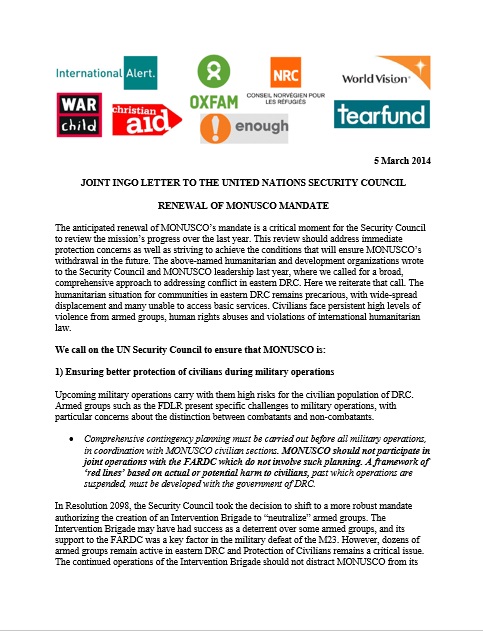
The United Nations Security Council is currently debating the extension of the mandate of the UN peacekeeping mission in Congo, which is up for renewal on April 1, 2014. Together with Oxfam, World Vision, and five other non-governmental organizations, the Enough Project published an open letter to the Security Council giving recommendations for MONUSCO on civilian protection, governance, and the peace process.
Below is a portion of the letter:
The anticipated renewal of MONUSCO’s mandate is a critical moment for the Security Council to review the mission’s progress over the last year. This review should address immediate protection concerns as well as striving to achieve the conditions that will ensure MONUSCO’s withdrawal in the future. The above-named humanitarian and development organizations wrote to the Security Council and MONUSCO leadership last year, where we called for a broad, comprehensive approach to addressing conflict in eastern DRC. Here we reiterate that call. The humanitarian situation for communities in eastern DRC remains precarious, with wide-spread displacement and many unable to access basic services. Civilians face persistent high levels of violence from armed groups, human rights abuses and violations of international humanitarian law.
We call on the UN Security Council to ensure that MONUSCO is:
1) Ensuring better protection of civilians during military operations
Upcoming military operations carry with them high risks for the civilian population of DRC. Armed groups such as the FDLR present specific challenges to military operations, with particular concerns about the distinction between combatants and non-combatants.
- Comprehensive contingency planning must be carried out before all military operations, in coordination with MONUSCO civilian sections. MONUSCO should not participate in joint operations with the FARDC which do not involve such planning. A framework of ‘red lines’ based on actual or potential harm to civilians, past which operations are suspended, must be developed with the government of DRC.
In Resolution 2098, the Security Council took the decision to shift to a more robust mandate authorizing the creation of an Intervention Brigade to “neutralize” armed groups. The Intervention Brigade may have had success as a deterrent over some armed groups, and its support to the FARDC was a key factor in the military defeat of the M23. However, dozens of armed groups remain active in eastern DRC and Protection of Civilians remains a critical issue. The continued operations of the Intervention Brigade should not distract MONUSCO from its protection role – its commitment to identifying, with the government of DRC, threats to civilians and implementing response plans.
- MONUSCO should more proactively mobilize non-military sections to interact with communities. This should include increasing resources to existing structures such as Joint Protection Teams and Community Liaison Assistants in order to understand the threats that communities face. MONUSCO must develop a better internal analysis to understand how its deployments, movements and engagement with the FARDC may have an impact on civilian populations (both as a direct and an indirect result of operations). Such an analysis would also prevent the mission from undermining community-level protection mechanisms.
2) Ensuring that conditions are conducive for MONUSCO’s withdrawal, with foundations in place for legitimate, accountable and effective civilian governance
The conditions for MONUSCO’s withdrawal from DRC will need to include the reestablishment of a civilian state presence in the east, a presence which will protect all citizens. Whilst ultimate
responsibility for this role lies with the government of DRC, MONUSCO should support the government to re-establish its civilian state presence in the east. MONUSCO has a role to play in ensuring that this governance includes free and fair local, provincial and national elections as well as reform of the police and judiciary. The commitment of the revised ISSSS to working in a more inclusive way with communities and local civil society to target area-specific drivers of conflict is a positive step forward to meet this objective. The revised ISSSS strategy recognizes that the presence of infrastructure does not necessarily amount to genuine civilian state governance and services. However, the proposed “Islands of Stability” approach introduces incoherency to MONUSCO’s stabilization approach by adding a different, military definition of stability according to FARDC/MONUSCO military operations. These operations are frequently short-lived and may be fragile. As a result, these “Islands” may be neither sustainable in terms of stability unless they are part of a broader strategy to foster better governance.

